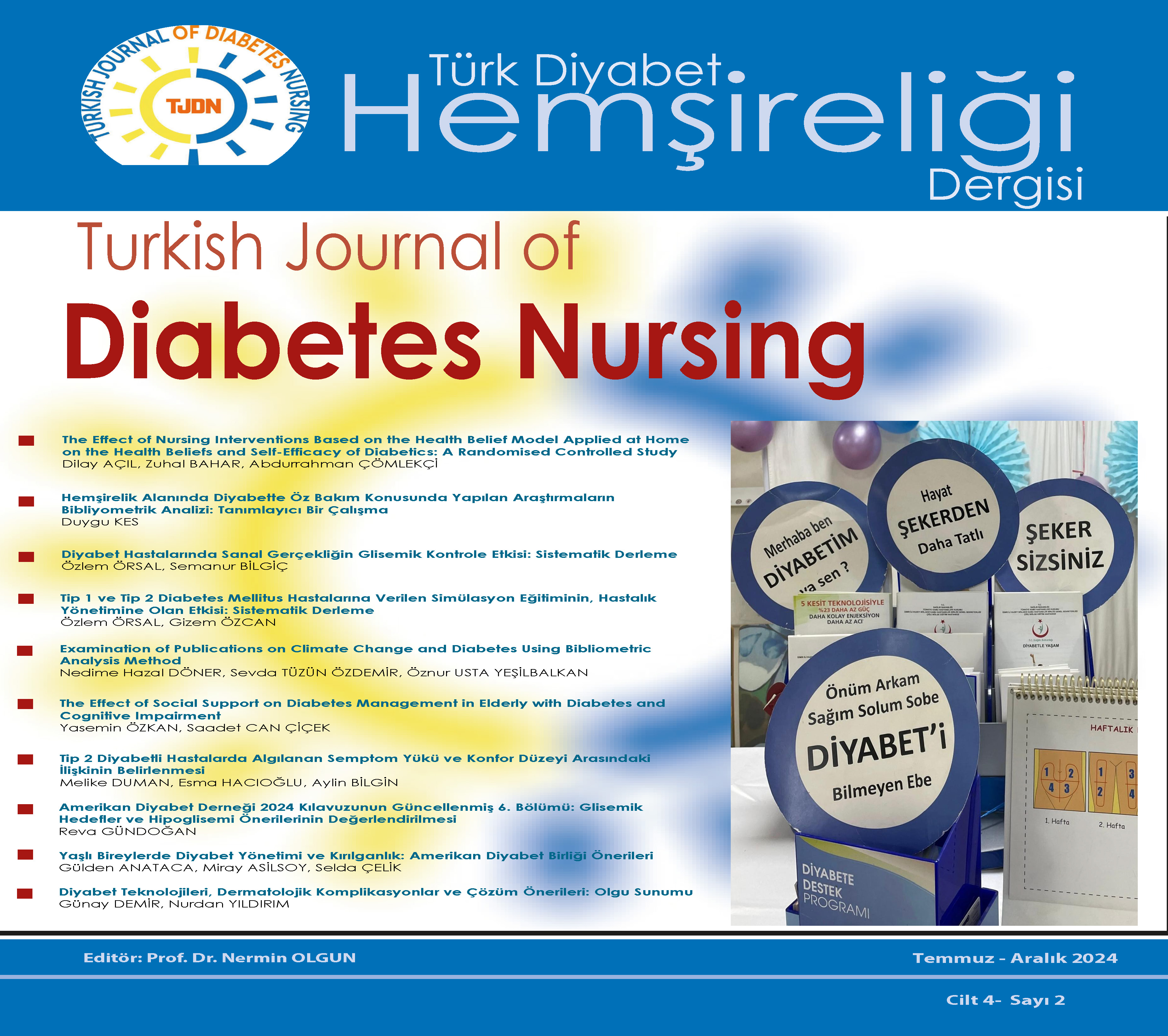Tip 1 ve Tip 2 Diabetes Mellitus Hastalarına Verilen Simülasyon Eğitiminin, Hastalık Yönetimine Olan Etkisi: Sistematik Derleme
Author :
Abstract
Amaç: Bu sistematik derlemede Tip 1 ve Tip 2 diabetes mellitus hastalarına verilen simülasyon eğitiminin hastalık yönetimine etkisinin değerlendirilmesi amaçlanmıştır.
Yöntem: PICOS kriterlerine uyan “diyabet”, “simülasyon” ve “hastalık yönetimi” anahtar kelimeleriyle Web of Science, PubMed, Cochrane, Scopus, Dergipark ve Google Scholar veri tabanlarından dört makale PRISMA-P kontrol listesi ile incelenmiştir.
Bulgular: İlki video izleme ve videodaki aktörü canlandırma, ikincisi web sitesinde bilgi oyunlarına haftalık düzenli katılım, üçüncüsü Yiyecekleri Öğren Büfesi ‘nde yiyeceklerdeki karbonhidrat miktarının ve içeriğinin oluşturduğu glisemik yanıta göre insülin dozunu ayarlamak, son olarak video, kitapçık, simüle edilmiş yapay cilt ve simüle edilmiş insülin enjeksiyon cihazı kullanarak kendi kendine enjeksiyon yapmak üzere dört farklı simülasyonla, üç adet biyokimyasal, sekiz adet öz bakım ve üç adet öğrenme olmak üzere toplam üç bölümde hastalık yönetimi incelenmiştir.
Sonuç: Simülasyon eğitimi verilen Tip 1 ve Tip 2 diabetes mellitus hastalarının, biyokimyasal belirteçlerden iki adet, öz bakım göstergelerinden yedi adet ve öğrenme çıktılarından dört adet olmak üzere hastalık yönetiminde başarılı olduğu görüldü. Ancak biyokimyasal belirteçlerden ve öz bakım göstergelerinden ikişer adet başarısız olduğu hastalık yönetimi alanı bulunmaktaydı. Bu çalışma ile, bu konuda yapılacak deneysel çalışmaların artırılması ve sağlık kuruluşlarında taburculuk eğitimlerine simülasyon uygulamalarının entegre edilmesi önerilmektedir.
Keywords
Abstract
Objectives: This systematic review aimed to evaluate the effect of simulation training given to Type 1 and Type 2 diabetes mellitus patients on disease management.
Methods: Four articles from Web of Science, PubMed, Cochrane, Scopus, Dergipark and Google Scholar databases with the keywords "diabetes", "simulation" and "disease management" that met the PICOS criteria were examined with the PRISMA-P checklist.
Results: The first is watching the video and portraying the actor in the video, the second is regular weekly participation in information games on the website, the third is adjusting the insulin dose according to the glycemic response created by the amount and content of carbohydrates in the food at the Learn Food Buffet, and finally the video, booklet, simulated artificial skin and simulated insulin. Disease management was examined in three sections, three biochemical, eight self-care and three learning, with four different simulations for self-injection using an injection device.
Conclusion: It was observed that Type 1 and Type 2 diabetes mellitus patients who received simulation training were successful in disease management, including two biochemical markers, seven self-care indicators and four learning outcomes. However, there were two areas of disease management in which he failed in two biochemical markers and self-care indicators. With this study, it is recommended to increase experimental studies on this subject and to integrate simulation applications into discharge training in health institutions.





